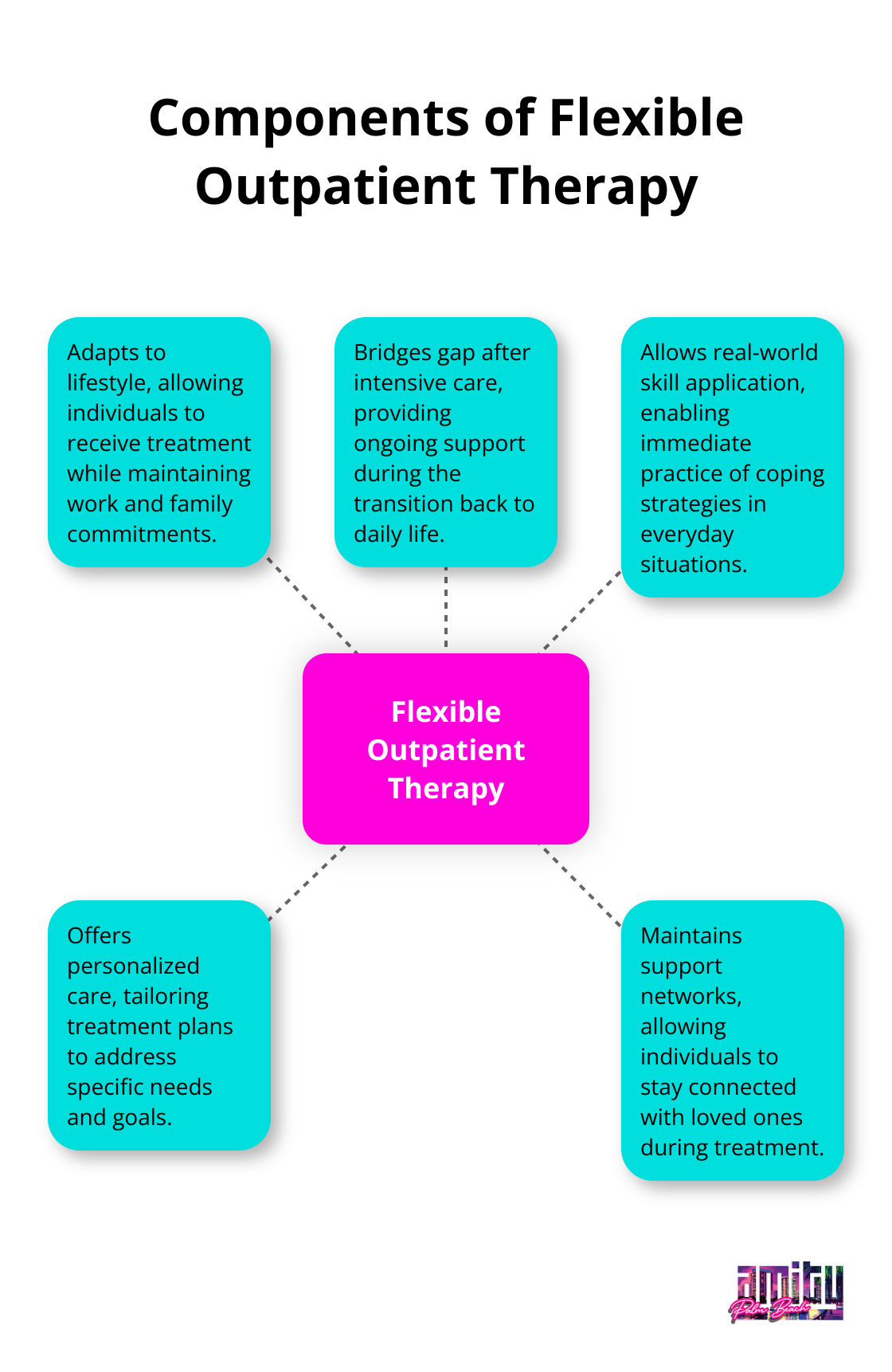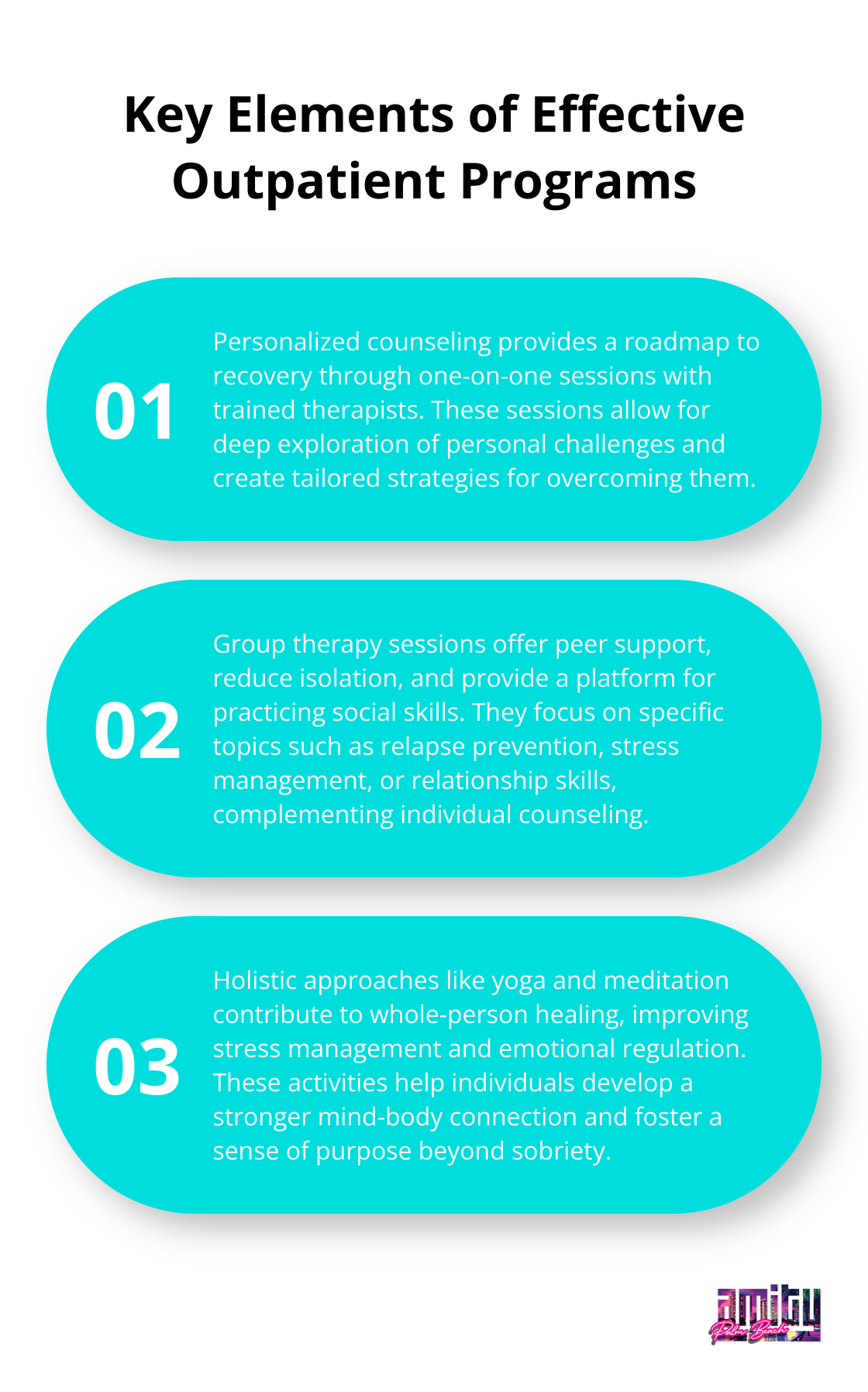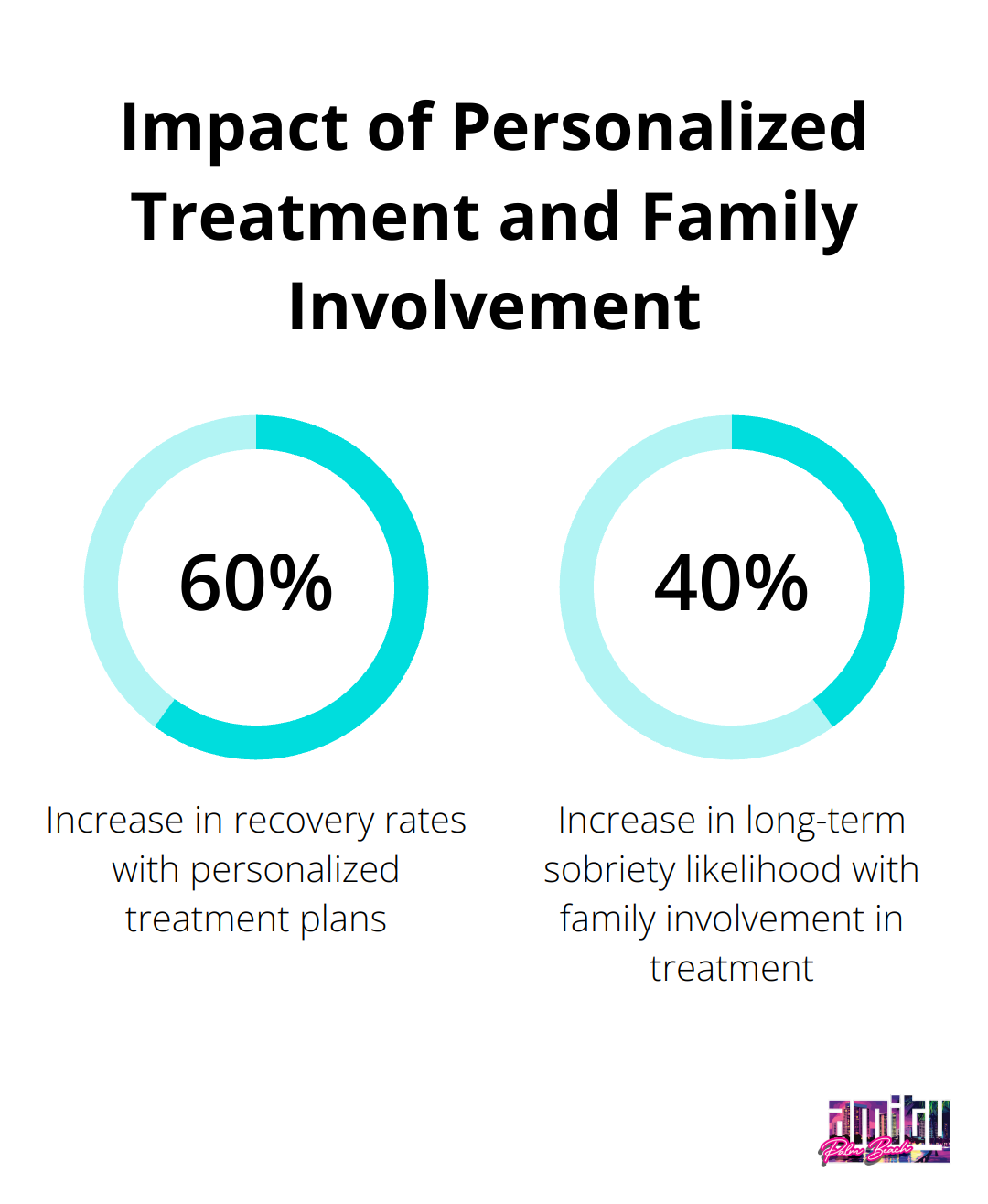At Amity Palm Beach, we understand the importance of maintaining progress after intensive treatment.
Flexible <a href=”https://share.google/V3Fb6lqR1VEcZD9gZ”>outpatient therapy</a> offers a powerful solution for continued wellness. It adapts to your lifestyle, providing ongoing support as you transition back to daily life.
In this post, we’ll explore the key components of effective outpatient programs and how they can be tailored to meet your unique needs.
How Flexible Outpatient Therapy Empowers Recovery
Adapting Treatment to Your Lifestyle
Flexible outpatient therapy revolutionizes addiction recovery. This approach allows individuals to maintain their progress while seamlessly integrating treatment into daily life. Unlike rigid inpatient programs, outpatient programs offer a wide range of services designed to help people achieve and maintain sobriety while integrating recovery into everyday life. Busy professionals, full-time students, or parents juggling multiple responsibilities can receive treatment without putting their lives on hold.
Many clients attend evening therapy sessions after work or opt for weekend appointments. This flexibility ensures that treatment doesn’t interfere with employment or family obligations.

Bridging the Gap After Intensive Care
The transition from intensive inpatient treatment back to everyday life often presents challenges. Outpatient therapy acts as a vital bridge during this period. It provides ongoing support and reinforces skills learned during more intensive treatment phases.
Research underscores the importance of continuing care. Continuing care is the foundation of long-term recovery, offering the tools and support needed to maintain sobriety and build a fulfilling life.
Real-World Application of Recovery Skills
One of the most powerful aspects of outpatient therapy is the immediate application of newly learned coping strategies in real-life situations. This real-time practice proves invaluable for long-term recovery success.
For example, a client might discuss a challenging work situation in therapy on Monday and implement new stress-management techniques at their job the next day. This immediate application helps solidify recovery skills and builds confidence in navigating triggers and stressors.
Personalized Care and Support
Outpatient therapy offers a high degree of personalization. Treatment plans can be tailored to address specific needs, challenges, and goals. This individualized approach (which may include one-on-one counseling, group therapy, or a combination of both) ensures that each person receives the most effective care for their unique situation.
Maintaining Connections and Support Networks
Unlike inpatient treatment, which often requires separation from loved ones, outpatient therapy allows individuals to maintain their important relationships and support networks. This continuity can be a significant factor in long-term recovery success, as it allows for the practice of new skills within existing relationships and environments.
As we explore the key components of effective outpatient programs, it becomes clear how these elements work together to create a comprehensive approach to recovery.
What Makes Outpatient Programs Effective?
At Amity Palm Beach, we’ve witnessed the transformative power of well-designed outpatient programs. These programs combine several key elements to create a comprehensive approach to recovery.
Personalized Counseling: Your Roadmap to Recovery
Individual therapy sessions form the cornerstone of effective outpatient programs. These one-on-one meetings with a trained therapist allow for deep exploration of personal challenges and create tailored strategies for overcoming them.
A study published in the Journal of Substance Abuse Treatment found that a larger proportion of group to individual therapy was strongly and positively associated with increased likelihood for improved measures of treatment outcomes. This finding underscores the importance of balanced care in outpatient settings.
The Power of Shared Experiences
Group therapy sessions complement individual counseling by providing peer support and diverse perspectives. These sessions often focus on specific topics (such as relapse prevention, stress management, or relationship skills).
Research from the National Institute on Drug Abuse shows that group therapy can effectively reduce feelings of isolation and stigma associated with addiction. It also provides a platform for practicing social skills and building a supportive network.
Holistic Approaches for Whole-Person Healing
Effective outpatient programs recognize that recovery extends beyond addressing substance use alone. Holistic activities like yoga and meditation are increasingly incorporated into treatment plans.
Yoga and meditation in outpatient rehab are two proven and effective practices that can help individuals in recovery develop a stronger mind-body connection. These activities help manage stress, improve emotional regulation, and foster a sense of purpose beyond sobriety.
Flexibility and Accessibility
The flexibility of outpatient programs allows for continuous adjustment of treatment plans to meet evolving needs and goals. This adaptability ensures that individuals can receive care that aligns with their changing circumstances and progress in recovery.
Outpatient therapy also offers greater accessibility (in terms of both location and scheduling) compared to inpatient treatment. This increased accessibility can lead to higher engagement rates and better long-term outcomes for many individuals seeking recovery support.

As we move forward, we’ll explore how outpatient care can be tailored to meet your unique needs and circumstances, ensuring the most effective path to lasting recovery.
How We Personalize Your Recovery Journey
At Amity Palm Beach, we recognize that every individual’s path to recovery is unique. Our approach to outpatient therapy focuses on tailoring treatment to meet your specific needs, ensuring the most effective and sustainable recovery possible.
Crafting Your Personalized Treatment Plan
The foundation of effective outpatient care lies in creating a treatment plan that addresses your unique challenges and goals. Our team of experienced clinicians works closely with you to develop a comprehensive plan that evolves as you progress through recovery.
Recent studies show that personalized treatment plans can increase recovery rates by up to 60%. This underscores the importance of individualized care in addiction recovery.
We conduct thorough assessments to understand your substance use history, mental health status, and personal circumstances. This information guides us in selecting the most appropriate therapies and interventions for your situation.
Addressing Co-occurring Mental Health Issues
Many individuals struggling with addiction also face mental health challenges. Our integrated approach ensures that both substance use and mental health concerns are addressed simultaneously.
The National Institute on Drug Abuse reports that individuals with co-occurring disorders who receive integrated treatment are twice as likely to maintain sobriety compared to those who receive separate treatments for each condition.
Our dual diagnosis program incorporates evidence-based therapies such as Cognitive Behavioral Therapy (CBT) and Dialectical Behavior Therapy (DBT) to address both addiction and mental health issues. This integrated approach helps you develop coping skills that are effective for managing both sets of symptoms.

Strengthening Your Support Network
Family involvement can significantly enhance the recovery process. We offer family therapy sessions and educational workshops to help your loved ones understand addiction and learn how to support your recovery journey.
A study in the Journal of Marital and Family Therapy found that family involvement in addiction treatment increased the likelihood of long-term sobriety by up to 40%. We facilitate open communication between you and your family members, helping to rebuild trust and create a supportive home environment.
Leveraging Technology for Accessible Care
In today’s digital age, we harness technology to make outpatient care more accessible and convenient. Telehealth options allow you to attend therapy sessions remotely when needed, ensuring continuity of care even when in-person attendance is challenging.
Research published in the Journal of Substance Abuse Treatment demonstrated that telehealth services for addiction treatment produced outcomes comparable to in-person care (with the added benefit of increased engagement due to improved accessibility).
Our secure telehealth platform enables you to connect with your therapist from the comfort of your home, making it easier to maintain your treatment schedule alongside work or family commitments.
Final Thoughts
Flexible outpatient therapy empowers individuals to maintain recovery progress while integrating treatment into daily life. This approach bridges the gap between intensive care and long-term wellness, allowing clients to apply recovery skills in real-world situations. The combination of personalized counseling, group support, and holistic activities addresses substance use issues and co-occurring mental health concerns effectively.
At Amity Palm Beach, we tailor outpatient therapy to each person’s unique needs, challenges, and goals. Our comprehensive framework includes addressing mental health issues, strengthening support networks, and using technology for accessible care. This personalized approach significantly enhances the likelihood of sustained wellness and personal growth.
We invite those seeking support in their recovery journey to explore the outpatient options at Amity Palm Beach. Our evidence-based care in a supportive environment provides an ideal setting for healing and growth. With the right support and resources, a life of lasting wellness becomes achievable.




